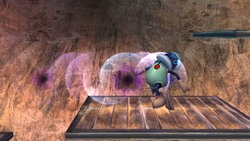Careening: Difference between revisions
(Oh yeah, I remembered the previous point from the Critical Hit trivia's page.) |
No edit summary |
||
| Line 7: | Line 7: | ||
The damage dealt by a careening enemy is dependent on the [[difficulty]], with higher difficulties making the attack weaker. Generally, larger enemies deal more damage when careening - a careening [[Greap]] would deal massive damage on any difficulty, while a careening [[Mite]] would barely deal any damage, even on [[difficulty|easy mode]]. Careening enemies also always use a special knockback angle encoded as 363, whose properties are mostly unknown. | The damage dealt by a careening enemy is dependent on the [[difficulty]], with higher difficulties making the attack weaker. Generally, larger enemies deal more damage when careening - a careening [[Greap]] would deal massive damage on any difficulty, while a careening [[Mite]] would barely deal any damage, even on [[difficulty|easy mode]]. Careening enemies also always use a special knockback angle encoded as 363, whose properties are mostly unknown. | ||
In ''Brawl'', tumbling fighters in standard matches are capable of careening into other victims, causing them to experience knockback as well; this is most apparent with very powerful moves such as [[Critical Hit]], or a powerful blow from a [[Soccer Ball]], which | In ''Brawl'', tumbling fighters in standard matches are capable of careening into other victims, causing them to experience knockback as well; this is most apparent with very powerful moves such as [[Critical Hit]], or a powerful blow from a [[Soccer Ball]], which gives careening fighters enough momentum to KO other opponents outright. This was removed in ''Smash 4'', although enemies in Smash Run and Master Fortress are still capable of careening. | ||
[[Category:Subspace Emissary]] | [[Category:Subspace Emissary]] | ||
[[Category:Game mechanics]] | [[Category:Game mechanics]] | ||
Revision as of 16:54, December 25, 2017

Careening (referred to in animations as "BulletMode", referred to by SSB4 tips as cannonball effect) is a state entered by defeated enemies in the Subspace Emissary, Smash Run, and Master Fortress. Once its HP reaches zero, a blast sound can be heard and the defeated enemy begins flying in a straight direction (based on the angle of the attack that hit it), bouncing off parts of the stage and damaging other enemies it runs into. Upon reaching a blast line or after a few seconds the enemy is removed from play.
The damage dealt by a careening enemy is dependent on the difficulty, with higher difficulties making the attack weaker. Generally, larger enemies deal more damage when careening - a careening Greap would deal massive damage on any difficulty, while a careening Mite would barely deal any damage, even on easy mode. Careening enemies also always use a special knockback angle encoded as 363, whose properties are mostly unknown.
In Brawl, tumbling fighters in standard matches are capable of careening into other victims, causing them to experience knockback as well; this is most apparent with very powerful moves such as Critical Hit, or a powerful blow from a Soccer Ball, which gives careening fighters enough momentum to KO other opponents outright. This was removed in Smash 4, although enemies in Smash Run and Master Fortress are still capable of careening.